Selections from our first year of original digital content.
Columbia College | Columbia University in the City of New York
Selections from our first year of original digital content.
In May 2017, CCT debuted original digital content on our website in a section we call “The Latest.” Our mission was to keep you connected to CCT and the College between quarterly issues, and to bring you more timely news about your fellow alumni. We hoped you would respond and boy, did you ever! “Take Five” — in which we ask alums five questions about their College experience — took off like a rocket, and we’ve been astounded by the range of personal stories and details you’ve shared. We’ve gone on to feature alumni voices from the Class of 1934 (writer Herman Wouk, who put out a book at 102!) to the Class of 2017 (CCT class correspondent Carl Yin) — in their own words, conversations, essays and even cartoon panels. (Ariel Schrag ’03’s graphic column, “Pregnant on the Subway,” was so popular it got thousands of pageviews!) It’s been a blast working on this, so to commemorate our first Latest anniversary we’re sharing excerpts from some of our favorite posts. You can find the stories in full and more at college.columbia.edu/cct/latest.
— Jill C. Shomer
Illustrations by Dr. Ben Schwartz ’03, PS’08
This quickly became our best-read section, and the responses have been incredible. Here are some we especially loved:
“All I know is that we’ve gotta get it
We’ve gotta make it on our own.”
— On Our Own
(Bobby Brown, 1989)
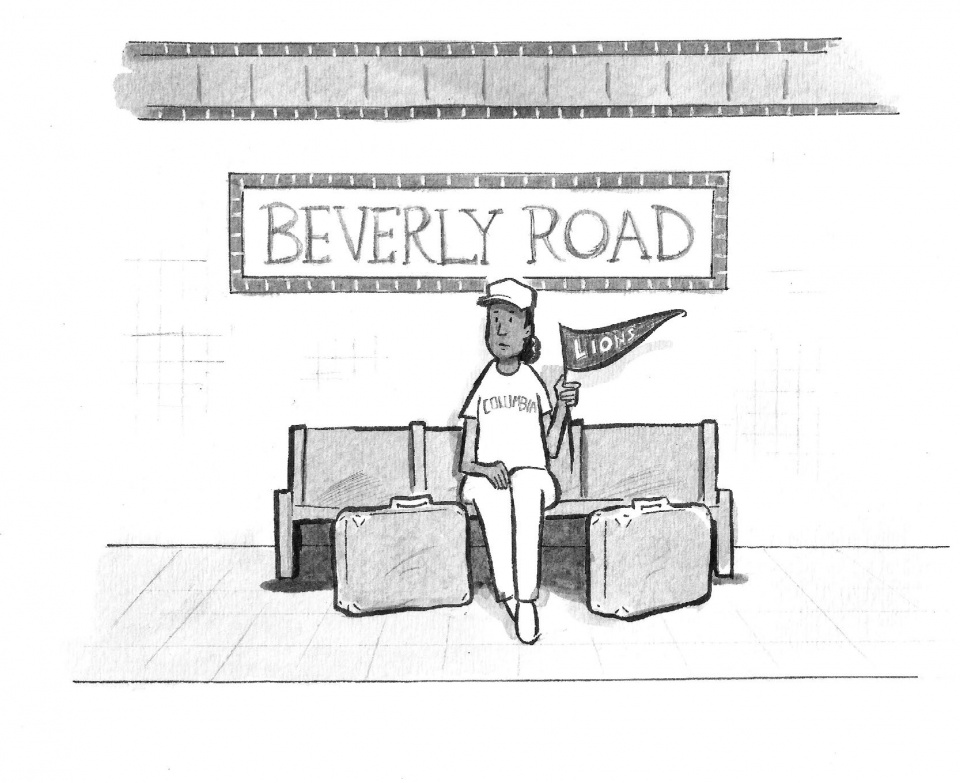
“My mother, a registered nurse and by then a nursing home administrator, had taken the day off from work to accompany me to Carman Hall. As the daughter of working-class parents, I knew that her daytime presence was a big deal. (My father, a welder, needed to go to work.) I knew for sure that I had my parents’ love and unfailing support, yet I remember thinking, ‘Wanda, you’re on your own now.’ My mother handed me $1,000 in cash that she had borrowed from her older brother. ‘This is all I have, and it’s not even mine,’ she said to me with tears and prayers in her eyes.
“When I arrived at Columbia, I was smart, strong and poor — traits that had made me both resourceful and resilient. I paid for my own education with loans, grants and earned wages.”
— Wanda M. Holland Greene ’89, TC’91, head of school at The Hamlin School in San Francisco
“Andrew Chiappe ’33, GSAS’39’s Shakespeare class and his seminar on King Lear. They were each life-changing in their way. In the first we read the plays chronologically, which was a radical concept in its day. All my Ivy League friends were reading the plays by category: comedies, histories, tragedies. We studied Shakespeare as he developed as a thinker and writer. We found the connections between Lear and The Tempest; we knew he had to write a spotty play in order to write a great one. We studied his growth and development as an artist instead of focusing on his greatest hits. I still have my Pelican Shakespeares with my notes written in the margins. To this day, I study the works of any artist I admire and want to know more about chronologically instead of only staying with their masterpieces.
“As for the King Lear seminar, we weren’t even halfway through the play when the spring semester ended. We parsed every word; we argued about every interpretation. I’m still at it. King Lear remains, for me, the greatest achievement of the human mind. I would not trade it for all of Mozart, Michelangelo or Chekhov. I thank Professor Chiappe and my fellow seminarians (I believe there were eight of us) for teaching me that a great work of art is worth a lifetime of study and the ultimate acknowledgement that it is finally unknowable. It is there for us all our lives to ponder and engage with. The Class of 2060 will be doing the same — and probably with no better results.”
— Playwright Terrence McNally ’60

“It’s difficult to forget your first-year living situation when it’s a Furnald double. I met my roommate for the first time with a rehearsed ‘hello,’ an open mind and a hint of trepidation. Whoever matched us perhaps saw we were both from California and thought that would be enough common ground to carry us through the year. For the most part they got it right, with one small exception — we had wildly disparate definitions of what constitutes a hygienic living environment. I’ve routinely been described as ‘intense,’ and naturally I projected my anal-retentive personality onto my half of the walls around me. Piles of clothes, scattered suitcases and at times an unplugged refrigerator would split our dimly lit double (it certainly didn’t help that the door was on his side of the obstacle course). In retrospect, it might have been his way of suggesting I spend less time organizing the room and more time enjoying my first year of college — a valuable message to hear, but a challenging one to live with.”
— Ryan Bubinski ’11, co-founder of Codecademy, a leading online education company
“I’ve thought about this periodically over the years. Naturally I wish I’d participated more in class. I wasn’t the best student to graduate from Columbia, but I didn’t really exploit the full breadth of academic life because I was so cowed by it. I never did office hours, never connected with a single professor. That’s a profound regret of mine. I also wish I’d stepped off campus more — seen more plays, explored more random subway stops, that sort of thing. But there were moments when glimmers of my bold, bad-ass self started to take shape, like the time I ran into the crew team cutie with the Elvis Costello glasses just outside Koronet the night before winter break my senior year. He was off to study abroad the next semester — this was it, probably the last time we’d see each other. We said our goodbyes, hugged and went our separate ways. Then I turned around, ran back into his arms and gave him a long, passionate kiss. Passersby stopped to gawk. It was cinematic. That’s my Columbia. And I wish I could do it over. Again and again.”
— Lea Goldman ’98, editor-in-chief of Lifetime Television
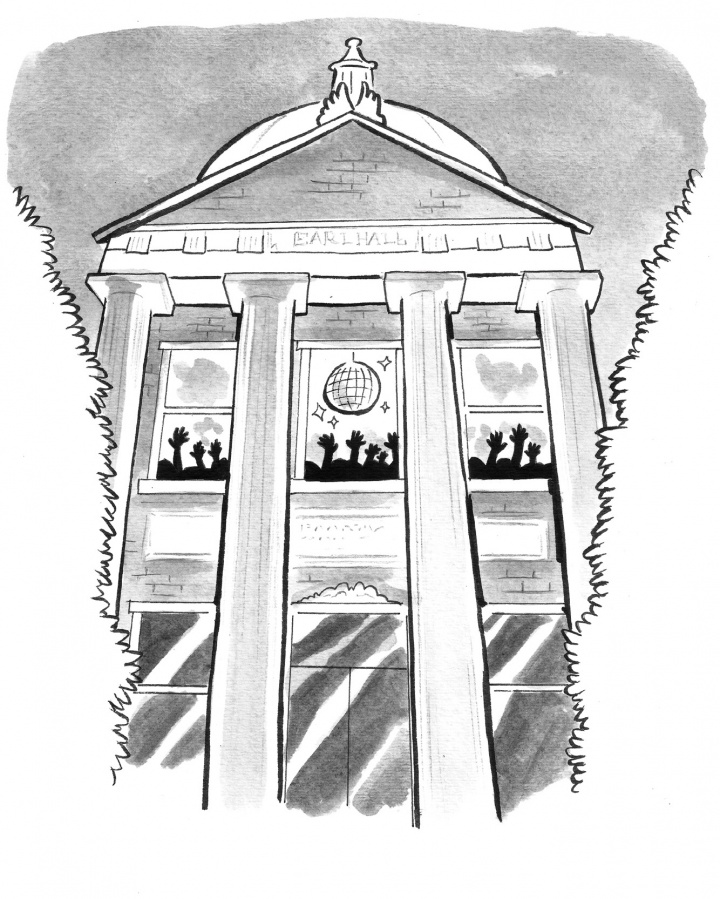
“I have a soft spot for Earl Hall, the stately McKim, Mead & White building, which not only housed the offices of chaplains and religious groups, but also hosted a monthly gay dance on its top floor with a starry dome (as I remember it, at least). Those dances were advertised downtown and come spring lots of men from the West Village and other points a #1 IRT subway ride away would show up. You could lie on the lawn in front of the building and engage in conversations with them. At that point anyone with a ‘real job,’ not a student, was a figure of fascination to me. I had no idea why they would want to travel to a student dance when they might go to far wilder venues downtown. Having grown up in the repressive 1950s in America, I had never danced with a boy. I did so, for the first time, to ‘Ain’t No Mountain High Enough’ at Earl Hall.”
— Poet, novelist and biographer Brad Gooch ’73, GSAS’86
A few times this past year we put alumni together for conversation on a subject that matters to them. In this case, CCT connected art curators Tim Griffin ’92, director of the experimental Chelsea space The Kitchen and the former editor of Artforum magazine, and Peter Currie ’07, director of the New York location of Galerie Buchholz, a Germany-based contemporary art gallery. Their three-hour lunch conversation was chronicled in a September 2017 post:
Currie: “I feel sometimes like that’s my job, and I’m not always good at it. Sometimes I have the feeling like I can’t stand in front of an artwork and open it up to people with various degrees of interest.
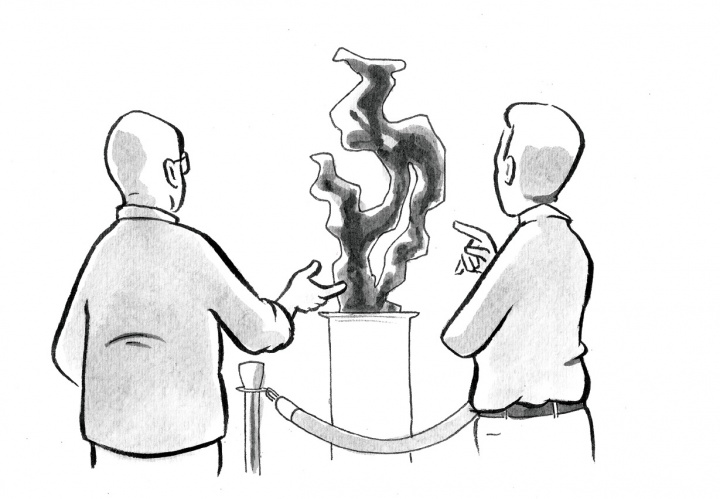
“That being said, art is art, and I kind of like that it’s hard for me. I don’t necessarily have a native fluency with it. There’s a lot that’s unknown that you come to slowly and in roundabout ways. I think it’s OK for art to be challenging or to have hurdles that you have to jump to be able to hold conflicting or complicated or vague ideas in your head. I don’t fight against that.”
Griffin: “I feel like it’s possible to speak in a way that makes art accessible without sacrificing sophistication. If you put the two of us together we’re inevitably going to go to a kind of specialist language that moves the conversation along; it’s a kind of shorthand. There’s nothing wrong with that. As a writer and editor, I feel like there is often an unnecessary fear that people won’t understand what they’re reading or hearing about. I think the public is a lot more sophisticated than the press, especially the art press, gives them credit for.”
Alumni in the know offered insights on newsworthy topics ranging from football-related brain injury:
“I would submit that the medical research is in early innings; how the safety issue will be resolved remains to be seen. I loved playing the game but have also lost teammates who suffered dearly and died from CTE [chronic traumatic encephalopathy]. Making a decision to let a child play at an early age would be very difficult.”
— Martin Domres ’69, record-setting Lions quarterback and former NFL pro, inducted into both the Columbia University Athletics
Hall of Fame and the Columbia Football All-Century Team
… to climate change:
“We have chosen a future where we, and our children, will have to adapt. Where plants — living organisms that make up our food source, and the ecosystems that support them — will be challenged by new conditions. Where our water sources might be threatened. Let’s be clear: We are choosing to adapt to these changes because we refuse to adopt modest lifestyle changes right now, changes that some might consider part of progress. I’m a climate scientist and I’m scared.”
— Oceanographer Meghan F. Cronin ’86
… to Oscar-nominated films:
“My favorite film of 2017 remains Blade Runner 2049, months after I first saw it. From a place of tone, mood and attention to detail, nothing holds a candle. The best movies don’t just stick with you in the moment; they linger over time. I’ll be hearing the roaring sound of those flying trucks rolling by for many years to come.”
— Justin Marks ’02, screenwriter; credits include Counterpart (2018) and The Jungle Book (2016)
Do you ever wonder what happens next in the lives of the alums CCT profiles? We do, and this section allows us to check in. We recently caught up with Robby Mook ’02, who was Hillary Clinton’s campaign manager in the 2016 election. He’s now a visiting fellow at the Harvard Kennedy School, working to develop strategies, tools and technology to protect democratic processes from cyber and information attacks:
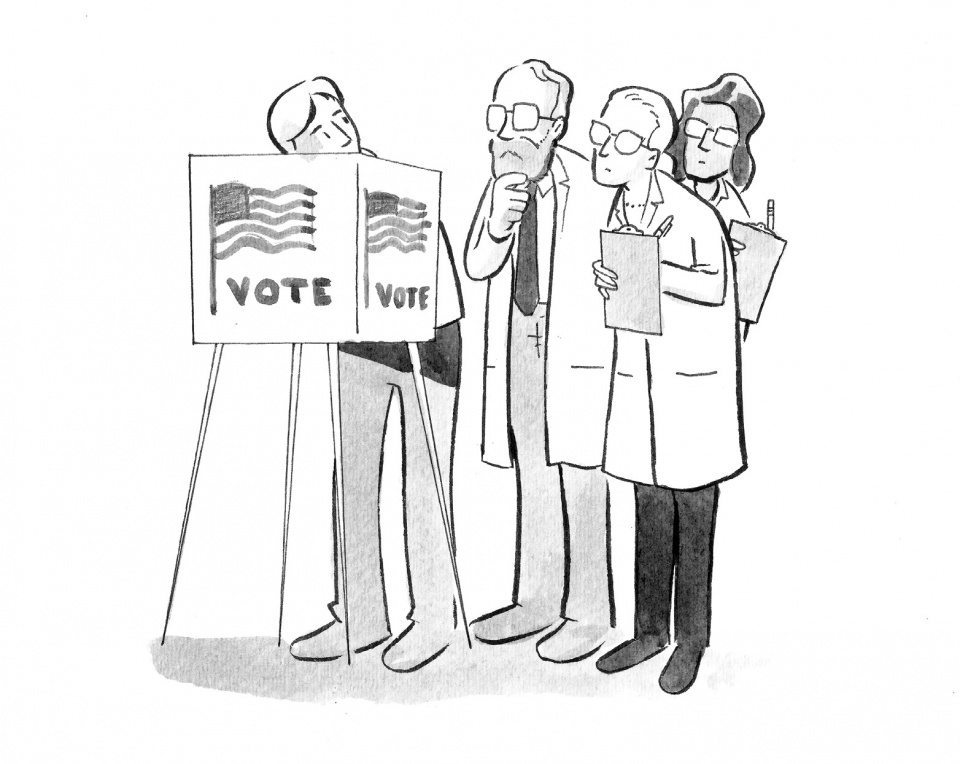
“[I think] the greatest challenge moving ahead for campaigns is how to really understand what voters are hearing and how they are feeling — I don’t think we have a good grasp of that right now. ... If anything, I’ve learned that campaign managers need to operate in an environment of tremendous uncertainty, volatility and change. ... I think we got blindsided a bit in 2016, and still haven’t figured out how to understand — of everything that’s out there — what voters are paying attention to and what information is actually getting through to them.”
“ ... [My current role] help[s] me to understand not just cyber-security in particular, but also more about how technology is influencing our security — the way we talk to one another, the way people engage in our democracy ... [I think] the biggest thing I’ve learned over the last few years is how campaign management is no longer a set of best practices that evolve in two-year cycles; it’s now an incredibly dynamic space. Managers have to learn to anticipate the unexpected and have to look at a campaign not as it is in the present, but where it could be.”
We also like to hear alumni stories that aren’t related to the College! Personal essays of all stripes get posted each month; Adam Mansbach ’98, SOA’00, author of more than a dozen books, including The New York Times bestseller Go the F**k to Sleep, shared his hilarious take on training for childbirth in “Birthing Class, Twice.” Here is an excerpt from that post:
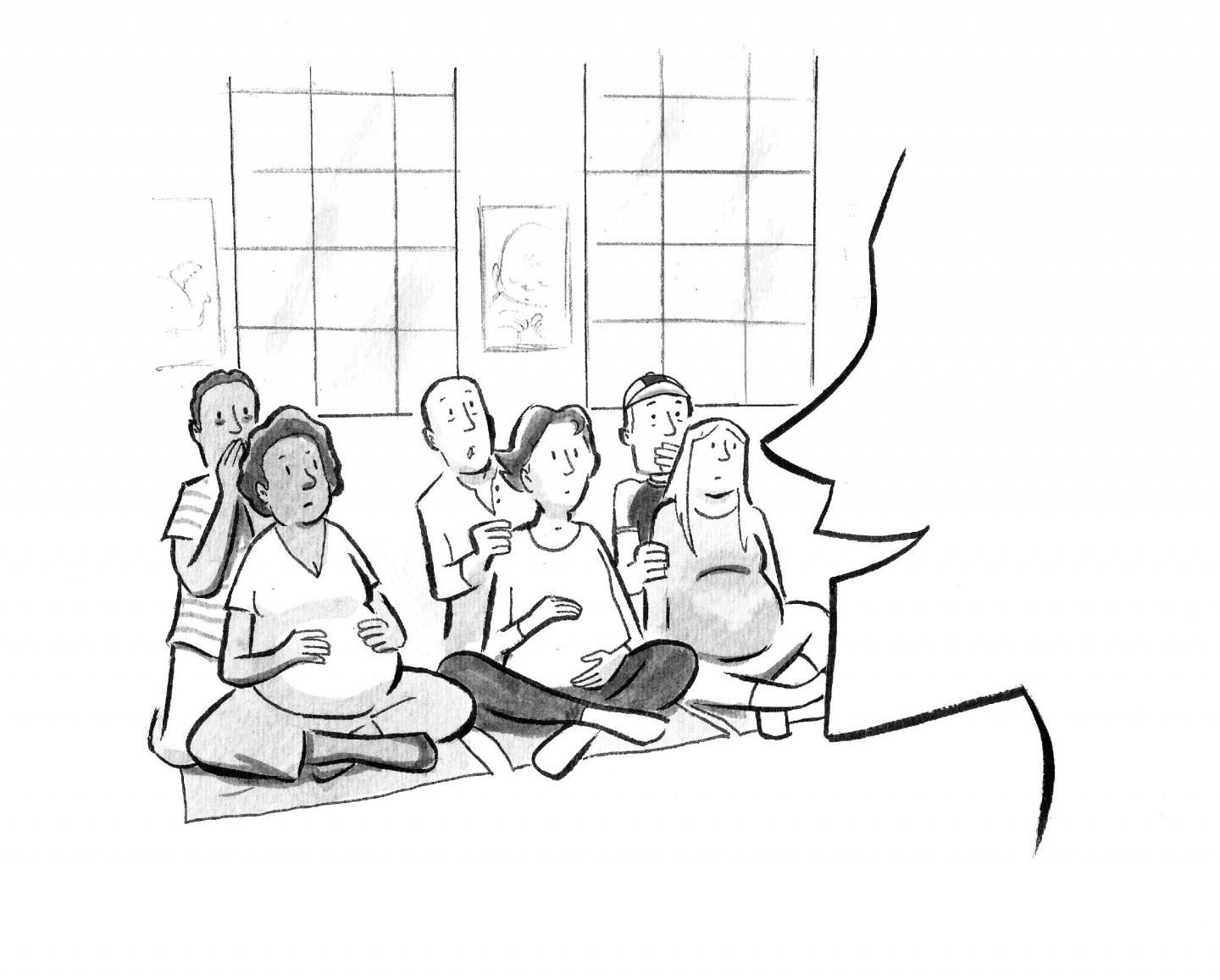
“The highlight of the class was when she tricked the women into drawing pictures like a bunch of third-graders as a pretext to lure the men out into the hallway and ask us how we were ‘really doing,’ away from all the macho posturing that can go on in a room covered in advertisements for in-home breastfeeding assistance.
“The answer was: Not well. One dude, who always showed up to the class in full biking regalia like he was fitting this in between stages of the Tour de France, said he was afraid his wife would die in childbirth. Not to be outdone, this other dude who was a professional Ultimate Frisbee coach said he couldn’t stop imagining the doctor coming into the waiting room and telling him that either his wife or his son was going to die and he had to pick which one.
“Obviously, these guys were completely unhinged. I mean, come on — waiting room? There’s no waiting room anymore.”

Published three times a year by Columbia College for alumni, students, faculty, parents and friends.
Columbia Alumni Center
622 W. 113th St., MC 4530, 6th Fl.
New York, NY 10025
212-851-7852
cct@columbia.edu

Columbia Alumni Center
622 W. 113th St., MC 4530, 4th Fl.
New York, NY 10025
212-851-7488
ccalumni@columbia.edu